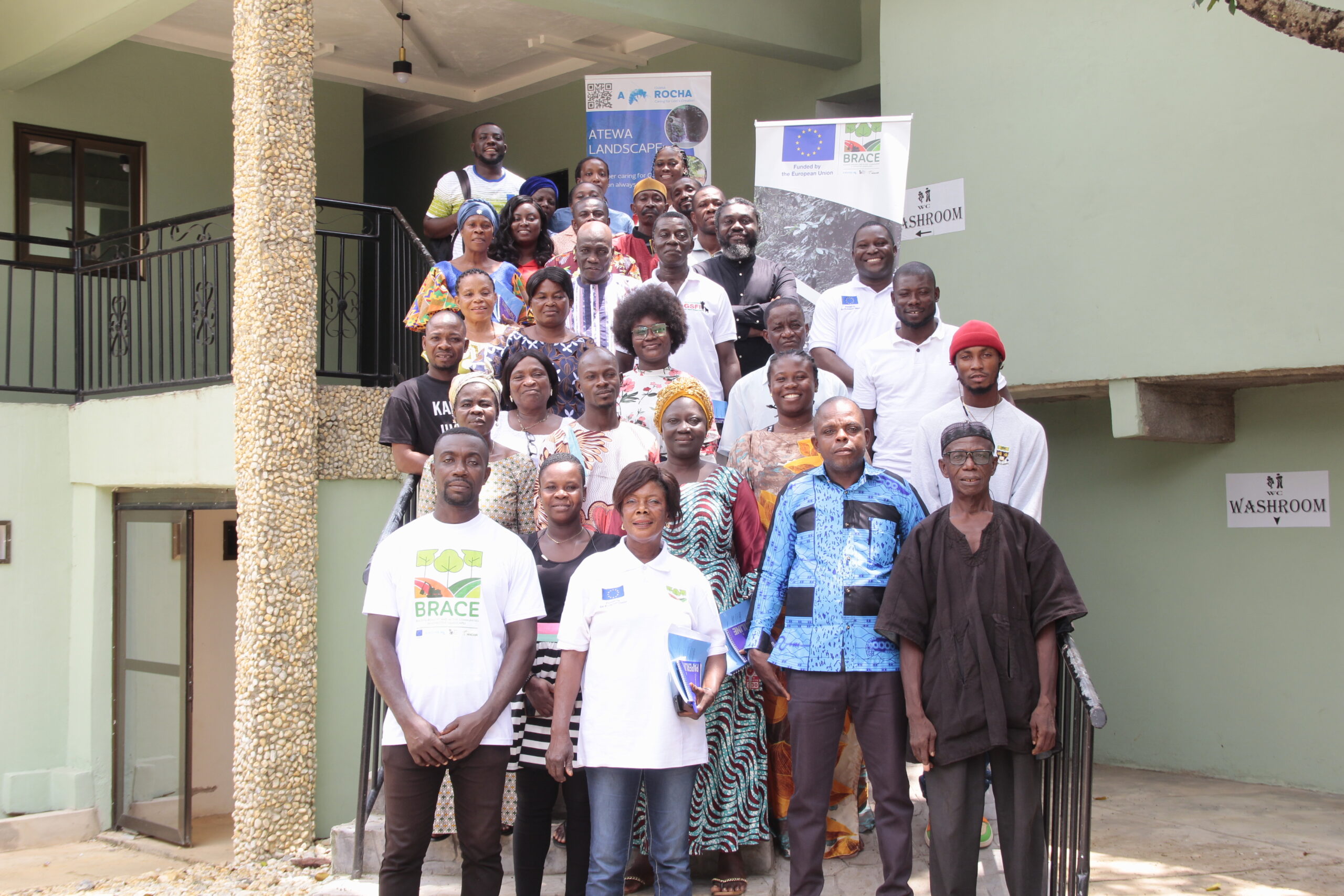In August, the BRACE project in Ghana launched a series of training sessions to disseminate knowledge and awareness to several stakeholders on natural resource governance and environmental rights protection in the extractives sector.
The trainings, conducted in the Eastern, Western, and Ashanti regions, attracted over 100 participants from approximately 63 target groups across more than 100 diverse mining communities. The main goal was to empower them to support sustainable practices and uphold accountability in the extractive industries.
Led by legal experts from Merton & Everette LLP, the workshops aimed to enhance target stakeholders’ knowledge in extractive sector local and international policy and legal frameworks, skills in evidence gathering, advocating for environmental rights, and ensuring accountability for environmental breaches.
Training Models
During the training, a variety of topics were covered, including national and international legislation and mechanisms that protect environmental rights and other human rights such as the constitution of Ghana, UN Resolutions of Human Rights to a Healthy Environment, the right to Free Prior Informed Consent (FPIC), and methods for effective advocacy and negotiation.
While issues of licensing were addressed, trainers also took time to discuss people’s rights to compensation when lands and resources will be or have been damaged by mining.
They further took participants through the roles and responsibilities of Ghana’s duty bearers and regulatory agencies like the Commission on Human Rights and Administrative Justice (CHRAJ); Forestry Commission (FC); Environmental Protection Agency (EPA); Minerals Commission amongst others in upholding and defending human rights and in ensuring good environmental management and natural resource governance.
Attendees were schooled on organizing a peace protest, obtaining information, and requesting a town hall meeting. The training referred to these as Avenues for Collective Action.
Interactive sessions and role-playing exercises were incorporated to ensure the practical application of the theoretical knowledge gained. These activities helped participants develop confidence in their newfound skills and prepared them to face real-world challenges effectively.
Now equipped with knowledge, these community members understand the importance of their consent for any projects impacting their lands, resources, and livelihoods.
Participants
Participants were drawn from major target groups from the BRACE target regions and communities. They included members of the traditional council, youth leaders, women’s groups, the media, NGOs/CBOs amongst others.
Participants shared their experiences and insights, fostering a strong sense of solidarity and mutual support among the various communities represented. The workshop also provided a platform for networking and collaboration, encouraging the formation of alliances to strengthen collective efforts in environmental advocacy.
As the workshop concluded, there was a palpable sense of optimism and determination. Community leaders expressed their gratitude for the opportunity to learn and grow, vowing to return to their communities with renewed vigor and a clear action plan.
The success of the BRACE Project training was a testament to the power of knowledge empowerment and collective action in driving positive change.
The groundwork laid by this workshop has set the stage for a brighter future where environmental rights are respected, and local voices are heard and heeded.
A Need to Join Forces
Speaking on the sidelines of the training, Lead lawyer, Oliver Barker-Vormawo said his firm was privileged to be part of leading the fight against illegal mining through the training programme and encouraged others to join forces in tackling the issue.
Barker-Vormawo emphasized that while democracy may lead to differing opinions, unity is crucial when it comes to environmental issues. The visible impact of environmental depletion he said, requires collaboration across various sectors – including the media, legal professionals, community leaders, and chiefs – to combat this threat.
“Maybe with our efforts, we can secure the environment for generations to come and they would not have to go through what we are going through,” he added.
Coordinator for the BRACE project, Daryl Bosu highlighted the need for such intense training. According to him, the mining industry had seen such a boom that so many communities have been adversely affected leaving entire communities in dire situations.
“We are not against mining but we also recognize the widespread impact it has had on many communities nationwide. Mining activities have led to the devastation of water bodies and forest reserves, as well as significant human rights violations in affected areas,” Mr Bosu said.
He added, “The encroachment of miners on agricultural lands is evident. It is crucial for communities to be informed about the proper and legal practices that should govern mining operations, ensuring progress without causing harm.”
About BRACE
BRACE is a three-year project funded by the European Union and implemented by a consortium of not-for-profit organisations Wacam and Nature and Development Foundation and led by A Rocha Ghana.
The project aims to ensure adherence to human rights, transparency, and accountability in mineral governance by contributing to sustainable and equitable environmental management and good natural resource governance in Ghana.



